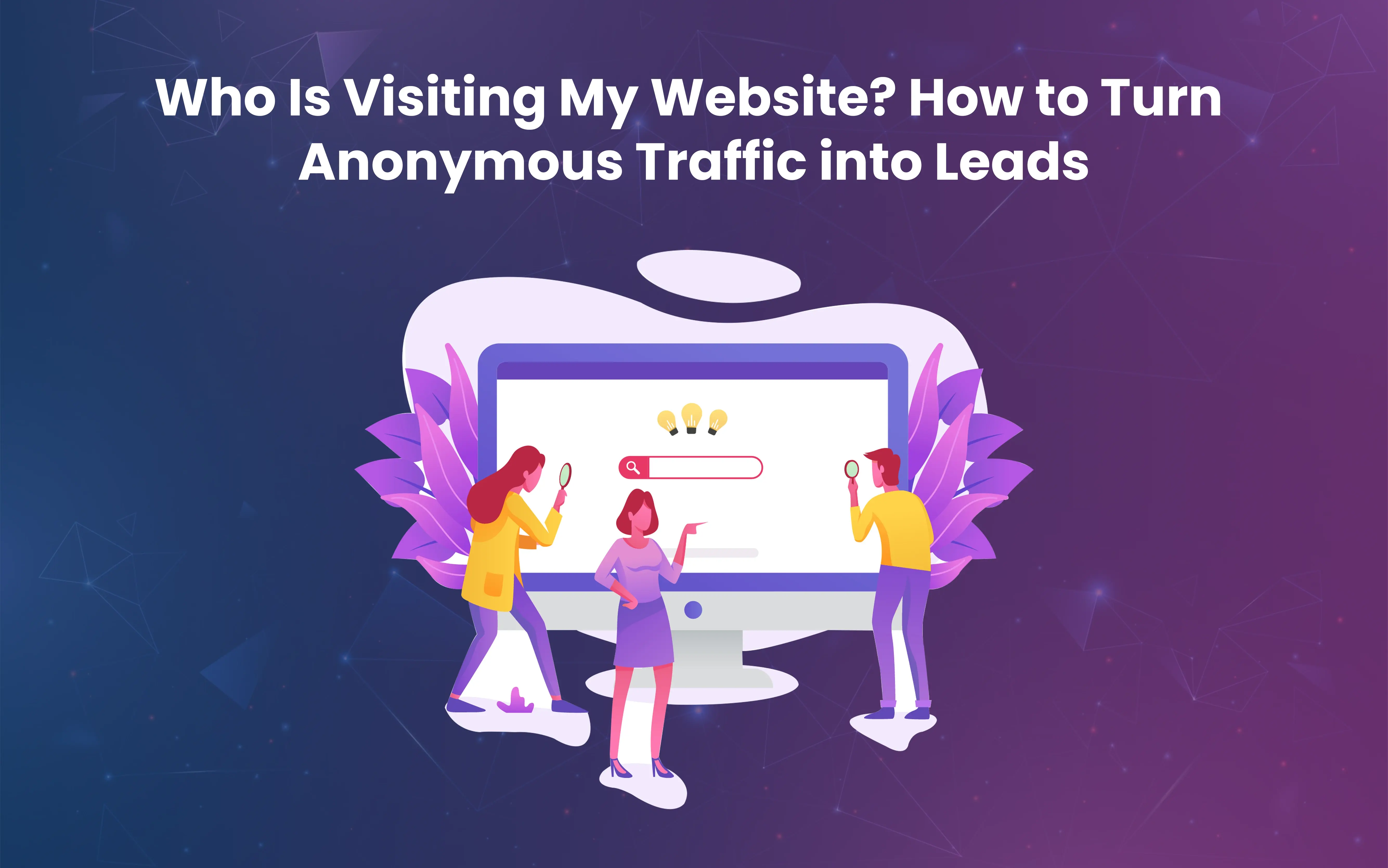Have you ever wondered: “Who is visiting my website?” You see the numbers in Google Analytics or on your dashboard—100, 500, maybe 5,000 visitors. But here’s the problem: you don’t know who they are. Are they decision-makers? Competitors? Or just random people browsing?
For most businesses, this traffic stays a mystery. And when you can’t see who’s visiting, you can’t follow up, start conversations, or turn them into customers. It’s like hosting a party where everyone wears masks—you know people showed up, but you don’t know their names.
The good news? You don’t have to stay in the dark. Today, smart tools called website visitor identification tools can reveal who’s behind that anonymous traffic and even help you turn visitors into B2B leads.
Why Identifying Anonymous Website Traffic Is Important
Think about your website as a store. You spend money on ads, SEO, social posts all to get people to walk in. But when they do, 95 out of 100 just look around and leave. They don’t tell you their name. They don’t give you an email. They just disappear.
Here’s what happens when you don’t know who your visitors are:
Lost Opportunities: Potential buyers leave without a trace.
No ROI Proof: You can’t show which campaigns actually bring the right people.
Sales Team Frustration: Reps chase random leads that don’t fit your business.
In B2B, where every deal can mean thousands of dollars, letting visitors vanish is like throwing money out the window.
Why Knowing Who Visits Matters in B2B Lead Generation
If you sell to other businesses, your buyers don’t impulse-buy like shoppers on Amazon. They research, compare, and take their time. That’s why catching them early, when they’re visiting your website is a golden chance.
Benefits of finding out who visits your website:
Better Targeting: Reach out to the right people, not just anyone.
Save Time: Your sales reps don’t waste hours chasing poor fits.
Higher Conversions: Leads already interested in your product are easier to close.
Prove Marketing ROI: Show your boss or team that campaigns actually drive real businesses to your site.
In short: if you can answer the question “Who is visiting my website?” you can supercharge your B2B lead generation.
What Is a Website Visitor Identification Tool?
A website visitor identification tool looks at the digital fingerprints visitors leave behind, like their IP address, company domain, or browsing behavior and matches them to real people and businesses.
Instead of just seeing “500 visitors this week,” you could see:
Company names (e.g., “TechCorp, 200 employees”).
Job titles (e.g., “Marketing Manager, IT Director”).
Pages visited (e.g., pricing page, case studies).
This turns “anonymous traffic” into a list of potential B2B leads your sales team can actually reach out to.
Popular Tools to Find Out Who Visits Your Website
Here’s a closer look at some of the well‑known website visitor tracking software available, along with a quick explanation of how they work.
Leadfeeder – Leadfeeder focuses on showing you which companies visit your website, even if they never fill out a form. It connects with Google Analytics data and enriches it to display firmographic information such as industry, size, and location. It integrates with CRMs like HubSpot and Pipedrive to push leads directly to sales. Pricing starts around $167/month but rises as traffic volume grows.
Source: Leadfeeder
Albacross – Albacross specializes in B2B traffic identification and account-based marketing. It segments anonymous visitors by company size, revenue, industry, and intent signals, which is helpful for marketers prioritizing accounts. Its dashboard offers lead scoring and export functions to CRMs. Pricing now starts at $117/month for only 150 identified leads and cost increases with volume.
Source: Albacross
Apollo.io – Apollo.io is a sales intelligence and engagement platform mostly used for manual outbound approach. It provides access to a massive B2B database with over 275 million contacts, allowing you to see not just companies but also decision-makers. Apollo.io also includes email sequencing, dialer, and engagement tools, making it a hybrid between a visitor identification tool and a sales engagement platform. Pricing starts with a free plan offering limited credits, with paid tiers beginning around $49/month and scaling up based on contact volume and features.
Source: Apollo.io
Demandbase- Demandbase is a premium ABM and website visitor identification solution that focuses heavily on company-level data. It identifies organizations visiting your site and enriches them with firmographic and intent information, but typically does not provide person-level contacts. Its pricing is on the higher side, often starting at several thousand dollars per year, making it best suited for mid-market and enterprise teams.
Source: Demandbase
These tools help you get started, but most stop at identifying data at company level. After getting these data you have to manually enrich and outreach the decision makers without knowing their buying intent.
Meet Kwin: The AI Business Developer
This is where Kwin, the AI Business Developer from Vison AI, stands out. Kwin is more than just another website visitor identification tool. She is designed as an AI Employee who not only finds out who is visiting your website, but also:
Identify – Reveals anonymous visitors at both company and person level.
Qualify – Checks if they fit your ICP and shows intent based on behavior.
Nurture – Engages visitors through progressive outbound nurturing, building trust.
Hand Off – Passes hot, sales-ready leads to your human team with context.
While other tools give you data, Kwin gives you actionable opportunities—ready for your business developers to close.
Why Kwin Stands Out from Other Tools
Here’s a simple comparison to make it clear how Kwin stacks up against other tools:
Most website visitor identification tools stop at the “data” stage. They show you a list of companies but leave the hard work of qualifying, nurturing, and engaging to your team. Kwin goes beyond by qualifying, nurturing, and handing off hot leads—making her a true AI colleague for your sales team.
Common Myths About Finding Out Who Visits Your Website
Myth 1: It’s creepy.
Reality: Tools don’t reveal private data like home addresses. They identify companies and work emails from business browsing activity.
Myth 2: It’s only for big companies.
Reality: SMBs gain even more because every lead matters when you have a small sales team.
Myth 3: It’s too complex.
Reality: Modern tools like Kwin are plug‑and‑play. Install a script, and you start seeing results within days.
Conclusion: Stop Guessing, Start Knowing
Your website visitors aren’t just numbers. They’re real people from real companies—potential customers who may be ready to buy. With the right website visitor identification tool, you can finally stop asking “Who is visiting my website?” and start turning that traffic into sales opportunities.
For SMBs and B2B teams, this shift is game‑changing. And with Kwin, the AI Business Developer, you don’t just get names—you get warm, qualified leads delivered straight to your sales team.
Want to stop losing anonymous visitors? Book a demo with Kwin, the AI Business Developer, today and watch how she turns your traffic into qualified B2B leads.



